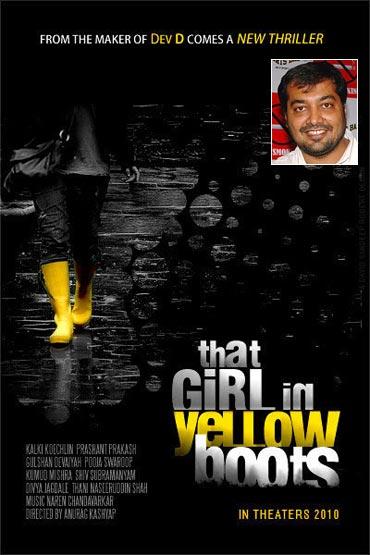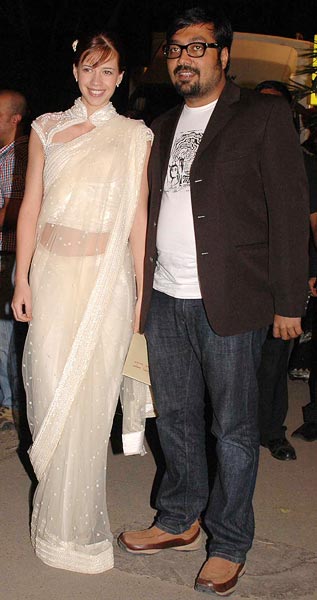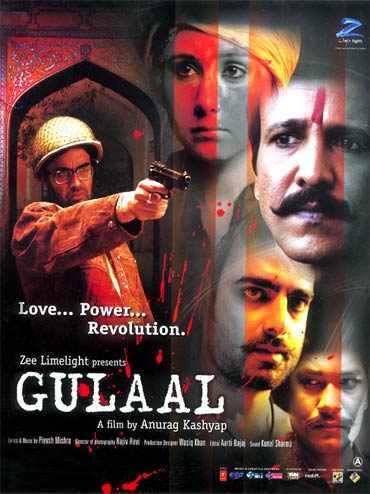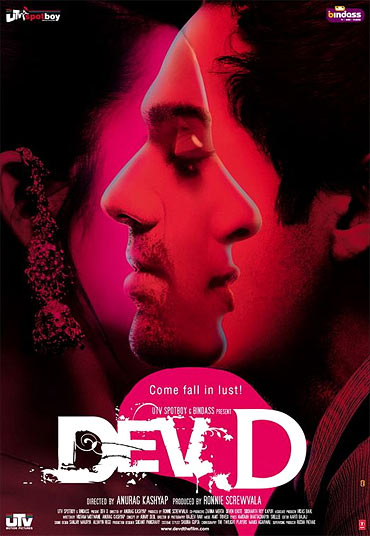Shaikh Ayaz in Mumbai
Anurag Kashyap's concerns, when we met him at his Andheri, Mumbai office, was his weight. "Look, how fat I have become. I must stop eating," he gestured to an assistant. But he knows he cannot resist good food just as he cannot stop making films.
His new film, That Girl in Yellow Boots, stars his wife Kalki Koechlin in a powerful role of a foreigner who comes to India in search of her father. It was the headlines of the day that inspired the film, says Anurag.
In the first part of the interview, Anurag talks to Shaikh Ayaz about his working relationship with Kalki, giving platform to young filmmakers and whether he's evolving as a writer and filmmaker:
How did That Girl in Yellow Boots originate?
It originated from various things, stuff that I read in the papers. A German girl who came to India and then another day, I read of a father raping his two daughters. So, those things stay with you and start bothering you. I discussed it with Kalki -- she was writing a play -- and I asked her if she will write it.
She started writing it. What she did was brought in her own experience. She's a girl who's born in India, grew up here but is still looked at as a white girl. I would say it's a film that evolved over a period of time.
Your title looks so similar to Juan Luis Bu uel's The Woman with Red Boots.
It's a nice title, isn't it?
'The day Kalki starts thinking in Hindi, she'll be a different actress'
Image: Kalki Koechlin and Anurag KashyapPhotographs: Pradeep Bandekar
How would you rate Kalki as a writer?
Very highly. Not because she's my wife but because she's done a fabulous job. I rate her highly as an actor, too. You must see her when she performs in English; she's so good that you feel no actor can touch her.
Her difficulty is Hindi, the language part of it. She has mastered Hindi, the speaking part of it, but the day she starts thinking in Hindi, she will be a very different actress.
How is it to collaborate with the person you are emotionally involved with?
When I started collaborating with Kalki, I wasn't married to her.
But to answer to your question, it's a joint effort because she brings a certain aspect to a script that I can't and vice versa. The thing is, after our marriage now, we are not even doing too many films. She's on her own, so am I. (Laughs) Okay, let me announce it to the world; this is our last film together.
'I'm extremely self-critical'
Image: A Paanch movie posterFrom Paanch to That Girl in Yellow Boots, do you think honestly you are evolving as a filmmaker? How self-critical are you in that respect?
On a personal level, my courage has evolved. The subject matters I want to look at are more rooted than ever before. I think I have simplified as a filmmaker. Like, the films I direct and produce are very different. If I direct, I only take a camera with me. That's all, there's no equipment. I just shoot the film in the simplest way.
And I am extremely self-critical. I keep my critics around me. I am not surrounded by people who give me wrong advice. (Laughs) People who criticise me the most are working in my office.
Don't you think the films you produce are more commercial than those you direct yourself?
I produce films only when I have belief in the director. For instance in Shaitan, I was the last person to come on board as a producer. That, too because Bejoy Nambiar has been a friend for a long time and I knew that he is a good director.
But yes, what you asked me is quite relevant -- my productions are definitely more commercial in the sense they are first-time filmmakers' films and as young directors the idea always is to reach out to everyone. Most of the times they get 100 per cent support from me.
Having said that, I cannot say the same thing about me. When I am making a film I keep in mind the constraints. I don't let them think of all that. I tell them to make the films they want to make.
'I call myself a reluctant producer'
Image: A Gulaal movie posterHow do you see this newer lot? Are they more talented than you?
They are more cinema literate. They are much braver than we ever were, or can be. I will tell you a secret -- this is the reason why the films I produce will always be more talked about than the ones I direct. Because these directors are doing shockingly good work.
There was a point when you were the most successful struggler. Today, this struggler has made good films, floated his own banner and is giving opportunities to young talent. Aren't your doors open for aspirants partly because you once suffered the same fate?
Yes, it is definitely one of the key reasons. My own struggle taught me a lot. I never wanted to be a producer in the first place. I still think I am a very ill-equipped producer. I am bad with money; I just can't handle money. It happens largely because I believe in these filmmakers and since nobody is producing their films I do it myself.
The first time it happened was when someone just asked me to come on board and said things will fall in place. Then it happened the second time, then third and I became a producer. So even those I didn't know from Adam's suddenly started coming to my office and I started getting an incredible number of scripts which no producer wanted to look at. I call myself a reluctant producer and actor.
Reluctant writer, too?
Yes, very much because when I wrote for others I never enjoyed it. Now, I have stopped.
'Paanch is my most impersonal film'
Image: A Dev D movie posterWhich has been your most personal film to date?
Gulaal, No Smoking, Dev.D and what's closest to me emotionally is That Girl in Yellow Boots. (Laughs) Paanch is my most impersonal film and Black Friday, the most objective and also, impersonal in a sense.






Comment
article